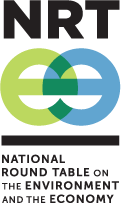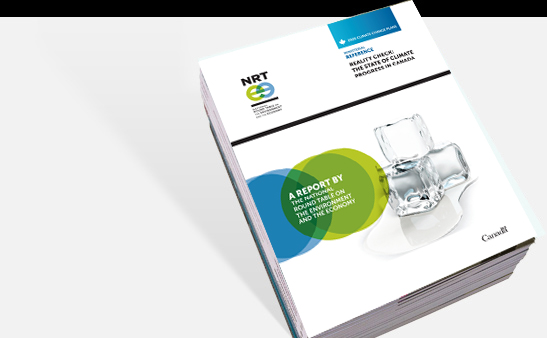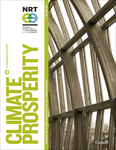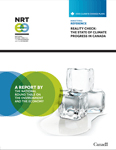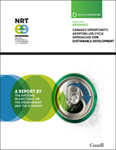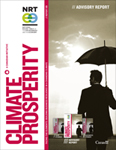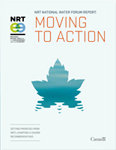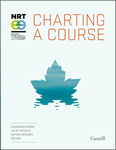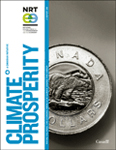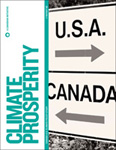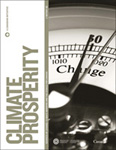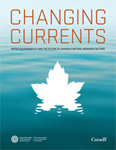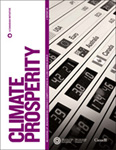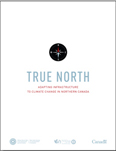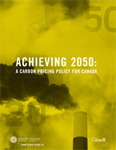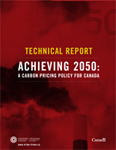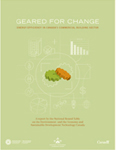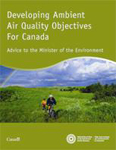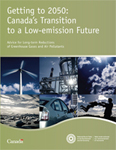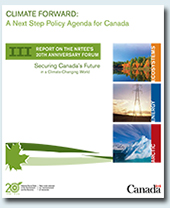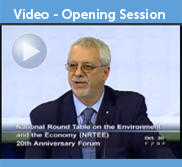NRTEE 20th Anniversary Forum
|
On October 30th, 2008, the National Round Table on the Environment and the Economy (NRTEE) commemorated its twentieth anniversary by holding a forum to discuss our country’s next climate-policy agenda. The forum, Securing Canada’s Future in a Climate Changing World, gave one hundred leading Canadians a rare chance to discuss how climate change would affect Canada’s environmental and economic future. Anticipating a renewed interest and commitment to climate change action in Canada and abroad, the Forum sought to consider what priorities and steps are needed to secure our future in three key areas—ecosystems, the energy-economy, and the Arctic—in the face of growing, expected climate change. Event Highlights Video[jwplayer mediaid=”21454″]The NRTEE forum spanned the three round table sessions involving more than forty participants led by three moderators and the Forum Chair, Pierre Marc Johnson. Over one hundred people joined in the Forum during the day. Participants represented the full array of interests, perspectives, and leadership involved in climate change or environmental/economic issues, and public policy. They came from industry, the environmental community, government, academia, the media, and public policy think tanks. They came from every Canadian province and territory, as well as the US, the UK, Germany and Mexico. They were activists and advocates; experts and columnists; public servants and politicians; ambassadors and academics; CEOs and environmentalists. They shared an abiding interest in the issue of climate change and what it means for Canada’s economic and environmental security.
|
Climate Forward:
|
Round Table 1 – Securing Canada’s Ecosystems
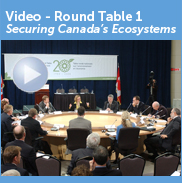 Our ecosystems are vital to Canadian economy and society. They provide essential services to human society, including provisionary services such as food, timber, and water; regulating services that affect climate change, the spread of disease, and water quality; cultural services that provide recreational and social benefits; and, supporting services such as photosynthesis that help to regenerate organisms in the system.
Our ecosystems are vital to Canadian economy and society. They provide essential services to human society, including provisionary services such as food, timber, and water; regulating services that affect climate change, the spread of disease, and water quality; cultural services that provide recreational and social benefits; and, supporting services such as photosynthesis that help to regenerate organisms in the system.
Projected changes in climate are expected to bring a range of challenges and benefits to Canada as our economic and social well-being is greatly influenced by the health and sustainability of these resources. Threats to ecosystem stability include changes in precipitation, growing seasons, temperature, and the influx of invasive alien species; all of which can be linked to climate change.
Roundtable 1 – Participants
Round Table 2 – Securing Canada’s Energy Economy
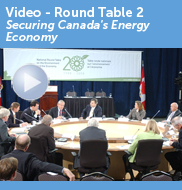 Energy-related emissions account for over 80% of Canadian GHG emissions; at the same time, energy-related industry accounts for 7 % of Canada’s GDP and national wealth. This sums up the challenge of securing Canada’s energy economy in the face of climate change. As the NRTEE has stated in its recent reports on climate change, transitioning to a low-emission future in a carbon constrained world will require important transformations and development within Canada’s energy economy.
Energy-related emissions account for over 80% of Canadian GHG emissions; at the same time, energy-related industry accounts for 7 % of Canada’s GDP and national wealth. This sums up the challenge of securing Canada’s energy economy in the face of climate change. As the NRTEE has stated in its recent reports on climate change, transitioning to a low-emission future in a carbon constrained world will require important transformations and development within Canada’s energy economy.
Over the past decade, reference to the concept of energy security has increased. In Canada, the energy industry is a major contributor to GHGs and to economic growth and wealth. Transitioning to a low-emission future in a carbon constrained world will require important transformations and development within Canada’s energy economy. High energy prices, growing demand for energy, and restricted production are contributing to changes in how we consume and produce energy in Canada, along with our energy mix. Securing an affordable and sustainable energy supply for Canada in the face of climate change will require more sustainable production and consumption choices.
Roundtable 2 – Participants
Round Table 3 – Securing Canada’s Arctic Environment
 Canada’s North and Arctic environment are already experiencing the effects of climate change. Melting sea ice, storm surges, and changes in species’ living patterns are all apparent. As climate change occurs in Canada’s North, new issues and questions are emerging about what this means to access to natural resources, protecting threatened ecosystems, sovereignty and security, and Indigenous peoples, northern communities and their way of life.
Canada’s North and Arctic environment are already experiencing the effects of climate change. Melting sea ice, storm surges, and changes in species’ living patterns are all apparent. As climate change occurs in Canada’s North, new issues and questions are emerging about what this means to access to natural resources, protecting threatened ecosystems, sovereignty and security, and Indigenous peoples, northern communities and their way of life.
Biodiversity, ecosystems, and cultural traditions are threatened by melting ice and warmer temperatures derived from climate change. Dramatic warming over the past century has led to significant summer sea-ice loss and permafrost thaw in the Arctic. Sea ice is now more unstable where Inuit hunters previously knew it to be safe; rising sea levels and reduction in sea ice makes coastal communities more vulnerable to storm surges and erosion; and, plant, insect and animal species are changing and adapting.
